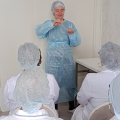Laboratory of Metagenomics and Molecular Indication of Pathogens
Print versionHead of the laboratory- Companoin of the Order of Pirogov, Candidate of Medical Sciences (PhD. In Medicine)
Nina F. Brusnigina

Was established in 1973 as the Laboratory of the Bacterial Genosystematics.
Directions of activities:
- Elaboration and improvement of molecular biological methods of indication, identification and systematics of opportunistic microorganisms.
- Development and testing of PCR-test systems, development of optimal algorithms for their application in the diagnosis of infectious diseases.
- Monitoring of difficult-to-cultivate and uncultivated microorganisms, including Mycoplasma, Chlamydia and Herpesviruses, Papillomaviruses, the research of genetic variability and antibiotic resistance of relevant pathogens.
- Elaboration of methodical techniques and optimal algorithms for conducting metagenomic studies.
- The laboratory is constantly evolving. The updating of the material and technical base, the development, improvement and introduction of innovative technologies, the high professionalism of the staff ensure the high quality of scientific research.
- Since 1996, the Volga-Vyatka regional scientific and practical center for the indication, identification and taxonomy of microorganisms and the organization of anti-epidemic work in extreme conditions has been operating on the basis of the laboratory.The center provides scientific, methodological, advisory and diagnostic assistance in the etiological deciphering of more than 30 nosological forms of infectious diseases (acute intestinal infections, purulent and serous meningitis, pneumonia, viral hepatitis, urogenital infections, Helicobacter pylori-, Mycoplasma-associatedinfections, Herpesvirus and Papillomavirus infections etc.) to health care and Rospotrebnadzor institutions.
Laboratory achievements:
- The optimal algorithms for indication and identification of relevant infectious agents by the PCR method have been developed: pathogens of urogenital infections (Chlamydia, Mycoplasma, Ureaplasma, Neisseria, Cytomegalovirus, Herpes viruses of different types, Human Papillomavirus of high carcinogenic risk, etc.); causative agents of inflammatory diseases of the respiratory system, neuroinfections (Neisseria meningitidis, Streptococcus pneumoniae, Haemophilus influenzae, Enterovirus), parenteral viral hepatitis B, C, D, G, TTV (with an assessment of viral load and genotyping of the hepatitis C virus); acute intestinal infections (Salmonella, Shigella, Escherichia, Campylobacter, etc.).
- The complex method for the diagnosis of Helicobacter pylori infection has been developed, which makes it possible to determine the amount of the pathogens, to monitor the effectiveness of the therapy carried out, to identify the genes for pathogenicity and drug resistance in Helicobacter pylori.
- The optimal algorithm has been elaborated for complex PCR examination of frequently ill children on bacteria of the genus Mycoplasma and Herpes human viruses, which allows to improve the efficiency and accuracy of diagnosis and treatment of diseases of unknown etiology.
- Pioneering studies have been conducted to determine the molecular mechanisms of resistance to fluoroquinolones and macrolide of urogenital Mycoplasma and original results have been obtained.
- For the first time, molecular genetic characterization of clinical isolates of Mycoplasma, Ureaplasma and Klebsiella resistant to antibacterial drugs has been performed using full genome sequencing.
- For the first time, genotyping of Cytomegalovirus, circulating in Russia has been carried out, the dominant genotypes in risk groups (children and patients undergoing transplantation of reputable organs) have been identified.
- New knowledge about the prevalence of various genotypes of high carcinogenic risk Papillomaviruses among the population of the Nizhny Novgorod regionhas been obtained, which alllowed to expand the information base for improving the epidemiological surveillance and improve the effectiveness of cervical cancer prevention.
- For the first time, a new medical technology “Comprehensive PCR-examination of patients with infectious and allergic diseases of the respiratory organs” has been elaborated, which allows to reduce the cost of research and increase the efficiency of identification of infectious agents.
Currently, the laboratory is providing assistance to health care institutions in diagnosing more than 30 nosological forms of infections and deciphering the outbreak of disease.
Prospects:
- Application of metagenomic approaches to study bacteria and viruses.
- Genotyping and molecular labeling bacteria and viruses - causative agents of relevant infectious diseases for solving fundamental and applied problems of epidemiology.
- Monitoring of Human Papillomavirus of high carcinogenic risk for the prevention of cervical cancer.
- Whole genome sequencing of bacterial genomes.
Phone: +7(831) 432-87-91 Nina F. Brusnigina
E-mail: mazepavn@mail.ru
Address: 603950, Nizhny Novgorod, Rodionova st., 192.





